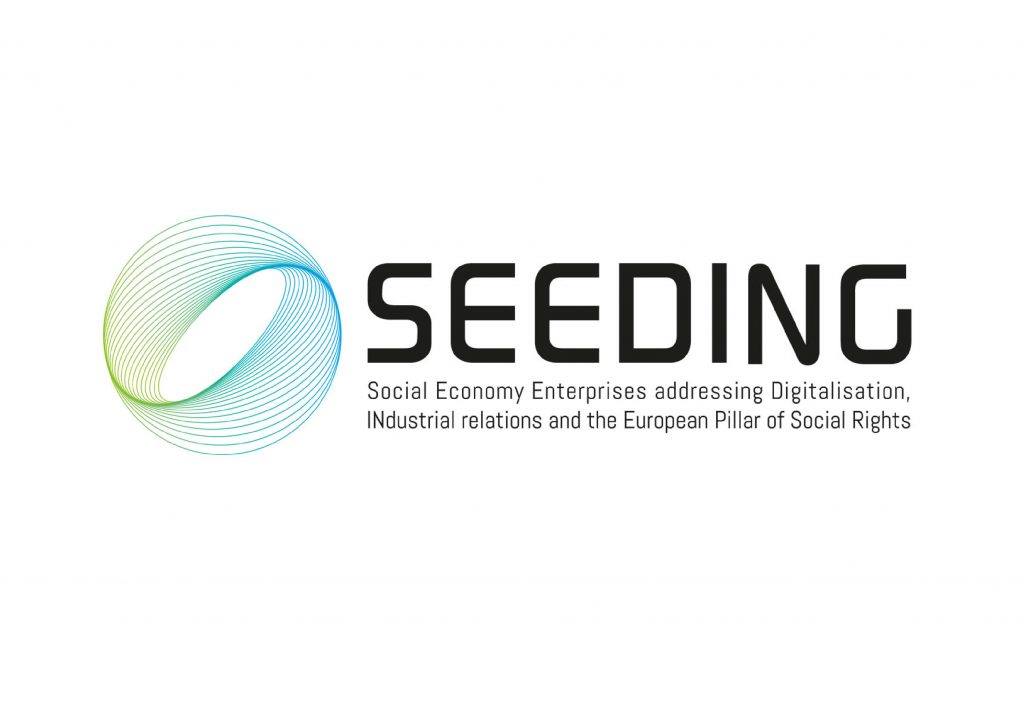What’s new in our SEEDING project, that aims to be the first project addressing Social Economy Enterprises and digital transformations?
The two-year long SEEDING project – Social Economy Enterprises addressing Digitalisation, Industrial relations and the European Pillar of Social Rights – has reached successfully its half-term. The project is supported by the European Commission. The project leader is the wide network of social economy enterprises, Diesis (Brussels) and the co-partner responsible for scientific coordination is Fondazione Giacomo Brodolini (Italy). Also, social economy organisations are actively contributing with their knowledge and network: ASES (Slovenia), Coceta (Spain), FISE (Slovenia), Gruppo Cooperativo CGM (Italy), Innova (Germany) and Legacoop Produzione e Servizi (Italy). The European Trade Union Confederation also following the project.
The project has a strong research focus. In the last one year, the project partners mainly concentrated on finding good examples how social economy enterprises deal with digital transformations and also exploring how social economy enterprises and their employers’ organisations deal with the impact on employment and working conditions in various countries.
At this stage, however the process was not always easy, there are many enterprises who confirmed their willingness to be part of the project and share their experience. Social economy has long tradition in Italy, France and Spain, also digitalisation is something that is kept relatively high on the agenda of stakeholders in these countries. In the project it was aimed to find such examples, what are not so well known yet but show the variety of digital challenges and possible answers given by the enterprises.
For example, France Barter (France) is a cooperative, B2B platform with 1350 members who provide services in a barter system without exchange of money. Formula Servizi (Italy) is a „traditional” cooperative active in the cleaning sector that was able to maintain its employment level while automating its services by reaching out new clients and retraining its staff, also to maintain robots. Som Mobilitat (Spain) a kind of co-operative which has only a few employees but able to mobilize local groups in order to protect environment by using shared e-car services. In other countries, the co-operative movement has very different traditions and the extend the sector add to national and local economy is more limited. In Ireland apart from the credit unions and agricultural co-operatives, the social enterprise sector appears to be underdeveloped. The logistic company, Speedpak is a registered charity and its innovative commercial businesses support long-term unemployed people get back to work by providing work experience, training, mentoring and supports. In Poland, the district dairy cooperative Piątnica introduced ERP (Enterprise Resource Planning) solution and automation of the production process, reducing processing costs while safeguarding its jobs. The affected workers were trained and moved to logistics and warehouse activities, and are actually benefiting of the increased productivity through higher salaries. In Slovenia, KNOF Zavod is also a B2B business group of several social companies aiming to recycle and re-use materials in a digitalised / automatized environment.
The case studies will be available later this year on the SEEDING’s website.
The findings will be disseminated in a form of background paper and case study report by the end of the project as well. The case study report will include information on 21 cases from seven countries and will be introduced on the final conference in Brussels early next year.
